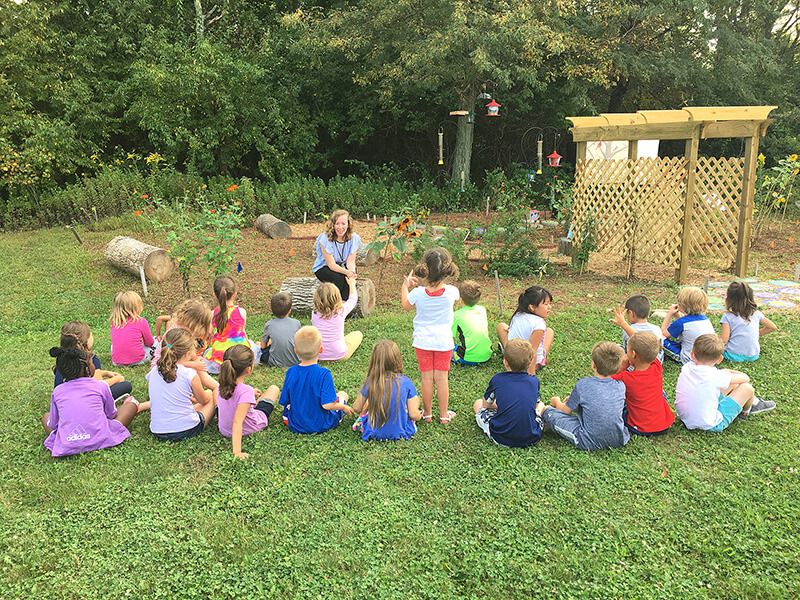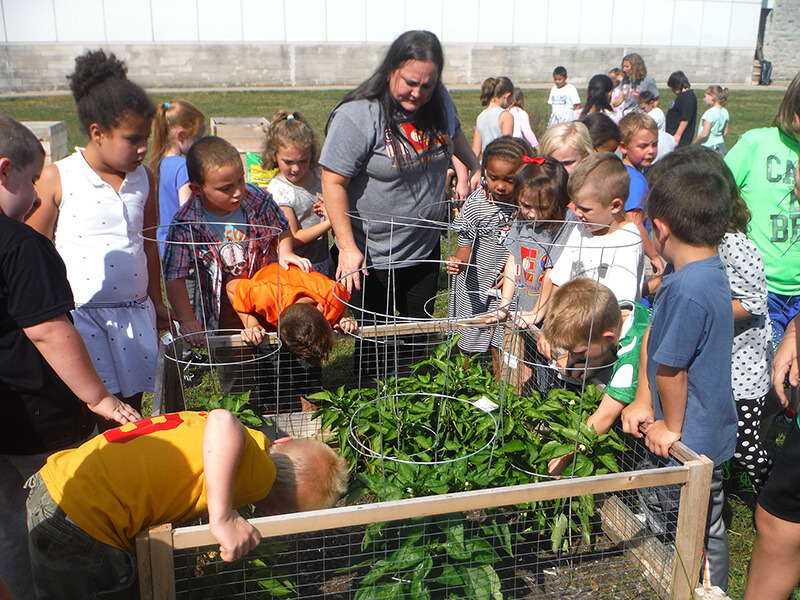October 17, 2017
‘Let’s go outside’ is gaining popularity as a part of Indiana teachers’ curriculum

The Nature of Teaching, a program offered by Purdue Extension, recently recognized Lafayette, Indiana teacher Jennifer Ruhl as a Dynamite Teacher.
WEST LAFAYETTE, Ind. — When third-grader Anna McCloud learned the name of a bird flying near her school in Lafayette, Indiana, she was somewhat astounded.
“I never knew that the chickadee was a real bird,” she told a teacher. “I thought my dad was making it up.”
McCloud is among a growing number of Indiana students who are experiencing the outdoors as an educational extension of Indiana classrooms. Through The Nature of Teaching (TNT) initiative hosted by Purdue Extension, teachers across the state are exploring ways to increase students’ exposure to nature. During a series of recent workshops, 58 teachers from 30 schools in 22 Indiana counties engaged in programs designed to connect youth with health and nature.
After using some of the techniques, teachers have been reporting positive outcomes among students, including genuine enthusiasm for exploring the outdoors.
“Today, kids seem to see nature as science fiction,” said David Lamb, a teacher at Wes-Del Elementary School in Gaston., Indiana. “They’re actually discovering species outdoors instead of looking at pictures of them on the internet. When they’re outside, they act like it’s something amazing.”
Jennifer Ruhl, the teacher at Mayflower Mill Elementary School in Lafayette, Indiana, who is encouraging Anna and her peers to explore nature, reported similar reactions among students. After setting up a bird feeder on the edge of the school property, Ruhl witnessed a “build-it-and-they-will-come” moment. Shortly after discovering the bird activity around the feeder, a group of second grade students decided on their own to start a bird watching club.
Next, Ruhl introduced the Junior Nature Club (JNC) to Mayflower Mill, which immediately attracted 65 students. Since then, club enrollment has tripled.
 Students at an elementary school in Bedford, Ind., have been discovering how to grow vegetables with the guidance of their teacher, Jamie Sterling Hooten, a participant of The Nature of Teaching program offered by Purdue Extension.
Download image
Students at an elementary school in Bedford, Ind., have been discovering how to grow vegetables with the guidance of their teacher, Jamie Sterling Hooten, a participant of The Nature of Teaching program offered by Purdue Extension.
Download image
“Obviously, the students here are excited to learn about the natural world,” she said. “Students are observing and interacting more with the school yard around them and telling their friends and families. I love to hear the kids imitating bird calls watching the feeders to ID which birds are visiting them.”
However, the program goes beyond children getting excited about bird activity, Ruhl said.
“Life is so crazy busy these days. People are getting more out of touch with reality, especially with the natural world,” she said. “With my kindergarten students, spending time outdoors helps to re-center their focus, calm them. The older students in JNC are learning specifics about nature - bird calls, bird ID, plant species and the existence of the food chain.”
Jamie Sterling Hooten, a fifth-grade teacher at Lincoln Elementary School in Bedford, Indiana, had been incorporating lessons on gardening, nutrition and composting for years after reading about the impact of gardening on students’ science achievement scores and social skills.
However, recently, Sterling Hooten has been motivated to use those same lessons as an opportunity to address challenges with obesity in her area.
“I had gardening as part of my classroom curriculum for nearly 10 years,” she said. “After attending Purdue Extension’s The Nature of Teaching program, it kick started me into thinking about the community’s obesity problem. We need them to realize there’s other food options out there besides McDonald’s and they can actually grow it themselves.”
Lamb, Ruhl and Sterling Hooten are among the teachers who have participated in Purdue’s The Nature of Teaching workshops. All three were recognized by TNT with its Dynamite Teacher award for their ongoing efforts to incorporate nature into their curriculum. Ruhl, who was recently honored with the award, is joining her students in considering several new projects, including planting fruit trees and developing a maze using native grasses.
Whether because of electronics or other modern-day distractions, students are losing the benefits of connecting with nature, according to Rod Williams, associate professor of Wildlife Science in Purdue’s College of Agriculture and a Purdue engagement fellow.
“Nature is critical to a child’s education,” said Williams, who hosted the four regional teacher workshops along with a team of county extension educators. “Many students are removed from nature at home. To this end, reconnecting youth with nature at school is now more important than ever. Incorporating standards-based lessons that integrate nature across subject areas is critical to the academic, cognitive and behavioral growth of our youth.”
Williams reported that nearly 80 percent of the teachers who participated in the workshops implemented programs at their schools. “Survey results demonstrate that students return to the classroom ready to learn,” according to teacher feedback.
Molly Hunt, a Purdue Extension educator, said TNT teacher recognition program was designed to encourage Indiana students as they pursue avenues for integrating nature in the classroom.
“Our team recognizes that teachers are limited with their time,” Hunt said. “Those teachers that have embraced and incorporated nature based experiential learning strategies deserve to have their creativity and ingenuity celebrated.”
The participants of the program also recognized the inroads that are being made as a result of teachers integrating various programming.
Lamb said that the community garden activities at his school involve more than just going outside and looking at plants and animals. “There’s a lot more to it. These programs are helping with the students’ physical and emotional health,” he said.
“This whole experience has really opened my eyes for the need for quality environmental education not only for the sake of preserving natural habitat and educating the youth of today about nature, but for reconnecting students with the world around them,” Ruhl added.
Contact: Shari Finnell, sfinnell@purdue.edu, 765.494.2722
Sources: Rod Williams, rodw@purdue.edu, 765.494.3568
Molly Hunt, hunt55@purdue.edu, 765.747.7732
Agricultural Communications: (765) 494-8415;
Shari Finnell, Manager/Media Relations and Public Information, sfinnell@purdue.edu
Agriculture News Page

